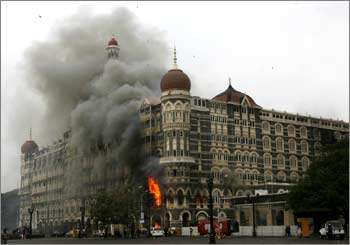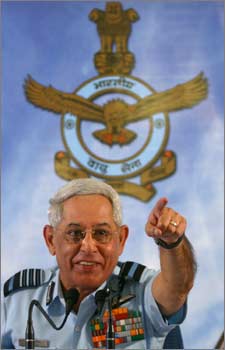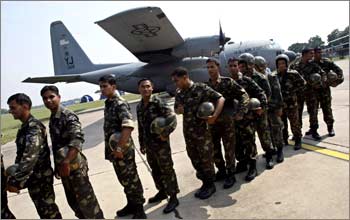Photographs: Arko Datta/Reuters
A lot of emphasis, in those anxious days just after the attacks, had been laid on the Indian Air Force which was believed to be kept on standby and was all set to launch an attack on Pakistan.
Air Chief Marshal Fali Homi Major, then the chief of the air staff, was in the thick of action because of the several warnings from the Intelligence Bureau that Pakistan-based terrorists may try and launch an aerial attack on India.
Now retired from the Indian Air Force, Air Chief Marshal Major speaks to rediff.com's Vicky Nanjappa and looks back at that dreaded day when Mumbai was attacked by 10 terrorists from the Lashkar-e-Tayiba.
In a major revelation, he says while the IAF was ready for battle, the government did not make up its mind on whether to go to war with Pakistan.
The eyeball to eyeball confrontation between the two countries was clear after the Mumbai attacks. We all thought that India would go to war against Pakistan. What made everyone change their mind?
Nobody changed their mind. In fact, the government never made up its mind to go to war.
I know the sentiment of the entire country was that of anger and disgust.
The Indian Air Force was ready to strike at Pakistan. We had our contingency ready and were well prepared. However, ultimately it depends on what the government wants.
There was also talk of an air strike along the border to destroy jihadi camps.
Yes, there was. However, the government was not in favour of an air strike across the border as it felt that it would escalate into a full fledged war.
'By the time Pak's role was established the will was lost'
Image: India's ex Air Chief Marshal Fali Homi Major at a news conference.Photographs: Vijay Mathur/Reuters
Like all people in this country, we too were shocked. It was an audacious attack on Indian soil and we were all truly shocked. The attack surely shook the entire country up.
How do you see Indian preparedness today to deal with a similar situation? Do you think we are better prepared after 26/11?
I am certain that we are better prepared today. However, it is not correct to expect results overnight. I would not say that the paramilitary forces and homeland security are fully equipped, since procurements would take some more time.
However, what is good is that the process has begun. This is a good sign because this was lacking prior to this attack.
You said the attack shocked everyone including those in the armed forces. Did you at any point of time think that it would be better to strike at Pakistan immediately?
Yes, it did shake us all up. But it is not that easy to strike at a country. Before going ahead and striking at a country, we need to establish a concrete link that the country (Pakistan) was involved in the attack.
This was the thinking in the government too that it first needs to be established that Pakistan had a role to play. However, by the time it was established the will was lost.
There was talk at that point of time that the air force was not in a position to carry out an attack. There was a similar opinion about the other wings of the defence forces.
That is not correct. I would say with a great deal of confidence that the armed forces are in some form of readiness at all times.
'China may have quantity, but cannot match our quality'
Image: The Garuds, the IAF's special forces, take part in an India-US joint exercise.Photographs: Adnan Abidi/Reuters
We were aware of this threat. Frankly speaking, an aerial attack is not really a threat since the IAF has the capability to tackle this threat with ease.
When one talks of an aerial attack, a comparison is drawn to the one carried out by the LTTE (the Liberation Tigers of Tamil Eelam) in Sri Lanka. That was just one plane and it is not difficult for the IAF to deal with such a problem.
Once again, I would say that our readiness to carry out a strike was always high and there is no doubting the capabilities of the Indian Air Force.
The threat of terrorism is still large. Do you think war would have been the better solution rather than depending heavily on diplomatic pressure?
Personally, I don't think that war is the right solution to counter a terror attack. If you start going to war for every terror strike then all countries would be at war with each other at all times.
Moreover, following the 26/11 attacks in Mumbai, the question of whether to go to war or not was a big decision for the Government of India.
We seem to have China phobia and get quite perturbed by their threats. Is it because we cannot match up to their military might?
India does not need to worry too much about China. They may have quantity, but cannot match our quality. Moreover, the scenario is not the same as 1962 and China cannot mess with India as it did in 1962.
Our forces are well equipped and the Indian brain is far ahead when compared to the Chinese brain.
The phobia of 1962 is definitely over and our deployment along the Indo-China border is very good.




article